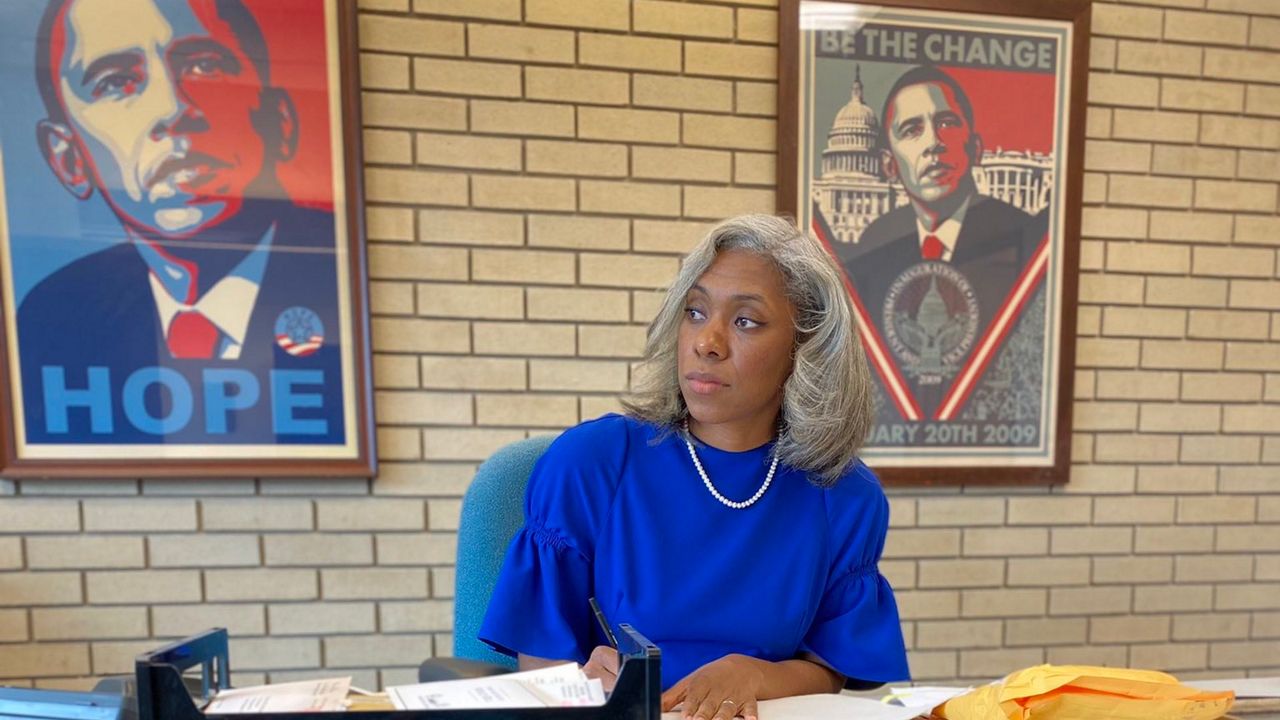ST. LOUIS — Every year, Nikylan Knapper is excited for Black History Month. But this February arrived with a little something extra. For the first time, Knapper wasn’t just celebrating Black history, she was making it.
“It really just hit me like a ton of bricks — I'm living Black history,” said Knapper, who was the first Black person elected mayor of Maplewood, Missouri in 2021.
To mark the beginning of her first Black History Month in office, Knapper, who was sworn in last April, posted two pictures of herself on social media. In one, she is sitting alone at a desk, appearing deep in thought. In the other, she is smiling at the camera with her three kids. In both, posters of Barack Obama are behind her. “I am my ancestors' wildest dreams,” she wrote.
Knapper is not alone. The 42-year-old is part of a historic increase in political power for Black women across the United States. There are now a record 26 Black women in the U.S. House of Representatives, seven Black women serving as mayors of top-100 population cities, including Tishaura Jones in neighboring St. Louis, and for the first time, a Black woman, Kamala Harris, is the vice president of the country.
While her office is smaller than theirs — Maplewood’s population is just over 8,200 — Knapper sees herself serving a similar role as other powerful Black women across the country.
“My charge in life is to make the path a little more clear, to open the door just a bit more, so that other young girls, other young Black children, can come after me,” she said. “They can say, ‘You know what, that Black woman is the mayor of a town. I can be a mayor or I can be a senator or I can do this.’”
Maplewood, Missouri is one of the many small cities in the shadow of St. Louis. Maria Langston, who serves on Maplewood’s shared school board with neighboring Richmond Heights, called it “one of the true last small towns in an urban environment.”
Knapper moved to Maplewood from Nashville in 2016 and quickly became involved in the community, volunteering with the school district, youth sports, and cub scouts. She ran for and won a seat on the school board but soon found herself eager to create more change.
Knapper didn’t initially see herself as a catalyst for that change. “I actually asked a colleague of mine on the school board if he would run for mayor,” she said.
After months of waiting for an answer, she made a final plea. “He looked me dead in my eyes and said, ‘I think you should do it,’” Knapper said. “I laughed in his face.”
She admits now though that the comment planted a seed. And soon, other colleagues began encouraging her too.
“We knew that she was the right person at the right time for this community,” said Langston, whose husband, Mark, is a former mayor of Maplewood.
On the school board, Langston said, she saw Knapper thoughtfully tackle equity and affordable housing issues. Knapper, who also serves as a federal administrative judge, was a meticulous researcher, Langston said. And after the protests that swept the nation in the summer of 2020, Langston said it became clear that Maplewood's next election marked a “crossroads for our community.”
“It's been something we've been talking about for years — much of our community doesn't see their faces reflected in its leadership, let alone the topics they were discussing,” Langston said.
Even with her colleagues’ encouragement, Knapper was hesitant. The final nudge came in the form of a Facebook post encouraging Maplewood residents to call the police over “graffiti” scrawled on a wooden fence.
“This was chalk on wood and it said ‘Black Lives Matters’ and the names of people who lost their lives in interactions with the police,” Knapper said. “It was not graffiti.”
For Knapper, the Facebook post was an example of how Maplewood wasn’t the idyllic community it’s so often portrayed as. “I just don't believe that our community is truly this Mayberry that some people want it to be,” she said. “I'm experiencing something different.”
When Knapper started her campaign for mayor, she said, she first had her first experience with racism in Maplewood.
“There was campaign material that went out from my opponent with a white woman saying, ‘If you want to continue to feel safe in Maplewood, then elect this person’,” she said. “Why wouldn’t you feel safe if I’m elected? It was a dog whistle, but I could hear it.”
In the end, Knapper won by a 16% margin, and in her first eight months in office, she’s found the job more demanding than the part-time label it comes with. “I have this term for three years and I need to do as much as I can as fast as I can,” she said.
Among her early wins was the creation of a Human Services Commission to ensure that “residents that are in Maplewood and want to stay in Maplewood can afford to do so,” she said. The city’s stock of housing is shrinking, she said, and rentals are getting more expensive thanks to gentrification.
Knapper is also working to be more inclusive of all the people in Maplewood, which is 74% white and 18% Black, according to the 2020 U.S. Census. She credits city manager Michael Reese with helping to center the voices of those who were previously overlooked.
"In Maplewood, we have diverse voices," she said. "Unfortunately, no one had reached out to talk with them. But now we are searching for voices in our community that are diverse, that have different experiences and backgrounds. We are moving the city of Maplewood forward."



